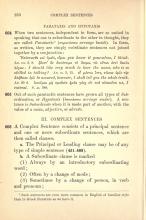604. When two sentences, independent in form, are so united in speaking that one is subordinate to the other in thought, they are called Paratactic[fn]Such sentenees are even more common in English of familiar style than in Greek literature as we have it.[/fn] (παρατάσσω arrange beside). In form, as written, they are simply coordinate sentences not joined together by a conjunction.
Ἐπίστασθε καὶ ῡ̔μεῖς, οἶμαι.
You knοw it yourselves, I think.
Xen. Anabasis 3.2.8
ἥδιστʼ ἂν ἀκούσαιμι τὸ ὄνομα, τίς οὕτως ἐστὶ δεινὸς λέγειν;
I should like very much to hear the name, who is so skilled in talking?
Xen. Anabasis 2.5.15
εὖ μέντοι ἴστε, πᾶσαν ῡ̔μῖν τὴν ἀλήθειαν ἐρῶ.
Be assured, however, I shall tell you the whole truth.
Plato Apology 20d
ἱκνοῦμαι μὴ προδοὺς ἡμᾶς γένῃ.
Do not abandon us, I entreat.
Soph. Ajax. 588
605. Out of such paratactic sentences have grown all types of subordination, or Hypotaxis (ὑποτάσσω arrange under). A sentence is subordinate when it is made part of another, with the value of a noun, adjective, or adverb.

